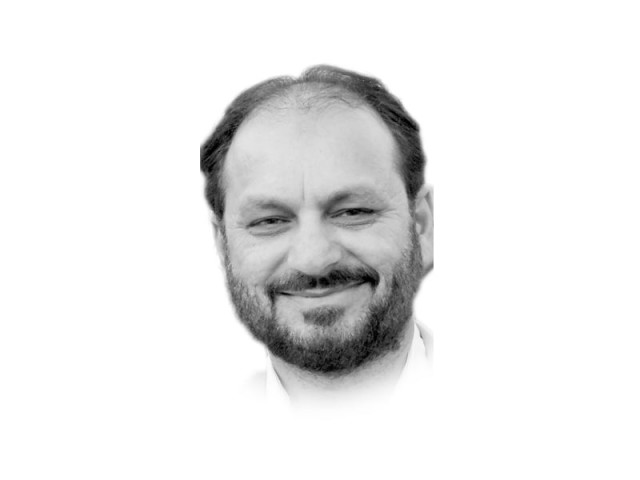Inflation, inequalities and mitigation measures
PTI government cannot afford to drag its feet against a national drive

The writer is a Chevening Scholar with a degree in Development Management from the UK. He currently works as an international consultant and can be reached at aftabalam_khan@yahoo.com
Petroleum prices, with the exception of a recent decrease of Rs5, have seen constant rise. Every rise in petroleum prices reinforces inequality. To rectify this injustice, Prime Minister Imran Khan can insulate motorcycles and rickshaws from any petrol price hikes by fixing them at a lower level. The revenue shortfall can be transferred to petrol consumed by 2,000CC and higher vehicles instead of an additional burden on government finances.
This will provide a much-needed relief to millions of low-income motorcyclists and rickshaw owners while the rich will hardly feel burdened by shouldering the revenue shortfall as a result of this initiative. They would instead receive nationwide appreciation. Similar measures are being exercised in the case of electricity and gas bills in the form of progressive charges and surcharges based on the number of units consumed by households.
Although general inflation — measured as the Consumer Price Index (CPI) — in February decreased by 2% in comparison to January, the overall bearing of the past 12-month inflation is yet to be revoked. The February CPI for food items in urban areas is still at 15.2% (as compared to 5.9% in February 2019) while rural areas witnessed an even sharper rise as the CPI for food items is still at 19.7% for February 2020 (as compared to 5.2% in February 2019.)
The nature of the impact depends on the structural inequalities in our society. The poor bear the heaviest burden because higher food prices hit more than half of their monthly budget. This is different for the well-off class that spends as low as 26% of their monthly income on food purchases. Wheat flour is a fundamental component of food security in Pakistan. Nevertheless, the poor feel greater pain due to the price hike as it spends up to 20% of its monthly income on wheat compared to the rich that spend as low as 8% on wheat flour.
In the budget for the FY2019-20, the federal government and the provincial governments of Khyber Pakhtunkhwa (K-P) and Balochistan raised the monthly minimum wage for unskilled workers from Rs15,000 to Rs17,500. Meanwhile, Sindh raised the monthly minimum wage from Rs16,200 to Rs17,000 and the Punjab government set the minimum wage at Rs16,500. Nevertheless, this is an agonising fact that a large majority of workers are deprived of the minimum wage. According to the latest 2019 Labour Force Survey of Pakistan, the average monthly wage for women working in the manufacturing sector is only Rs6,597. Similarly, in the mining sector women receive an average monthly wage of Rs5,040 only. And a large number of private schools also violate the minimum wage rates by paying teachers Rs5,000–8,000 per month. In the agriculture sector, that comprises the largest number of women, the monthly wage amounts to only Rs6,000. The Sindh government recently passed the Sindh Women Agriculture Workers Act 2019 that calls for equal wages for women farm workers along with many other relief measures. However, its implementation is yet to be seen.
The Prime Minister can use his convening authority to rally the provincial governments and their labour departments to lead a drive for the implementation of minimum wage that will change the lives of millions of households by introducing an increase of Rs10,000-11,000 in the monthly income.
Now let’s look at the amount of minimum wage itself. Is Rs17,500 an adequate minimum monthly wage? The Household Integrated Economic Survey, that was last published for 2015-16, shows that the monthly consumption expenditure of the lowest income quintile was Rs20,000. That means even that five years ago the monthly expenditure of the poor was much higher than the current minimum wage. Considering, the inflationary changes in the last five years and the increase in the dollar exchange rate from Rs101 to 156, there is a dire need to increase the minimum wage. According to the Pakistan Institute of Labour Education and Research, the minimum wage should be set at Rs35,000 per month. The Prime Minister can bring together representatives of the provincial governments, employers and employees to set up and implement an appropriate minimum wage throughout the country.
Wages and salaries are the largest source of income for the lowest income quintile in Pakistan, which makes for over 63% of the urban and over 42% of the rural population. Hence, the above minimum wage related measures can immediately bring a relief for a large number of Pakistanis.
Prime Minister Imran Khan, in the last two months, has taken serious measures to offset the impact of rising inflation such as the reinvigoration of the Utility Stores Corporation (USC), actions against hoarders and the approval of subsidies for fertilizers. Besides, social protection initiatives under the Ehsaas programme are expanding to uplift the lives of the poorest people.
The existing situation, however, calls for expanding relief by fixing lower petrol prices for motorcycles and rickshaws, implementing the existing minimum wages and setting up new wages according to inflation. This should be easily doable as the PTI government cannot afford to drag its feet against a national drive. The consequent rise in purchasing power of the people will lead to substantial spending that will ultimately propel economic growth in the country.
Published in The Express Tribune, March 14th, 2020.
Like Opinion & Editorial on Facebook, follow @ETOpEd on Twitter to receive all updates on all our daily pieces.
















COMMENTS
Comments are moderated and generally will be posted if they are on-topic and not abusive.
For more information, please see our Comments FAQ